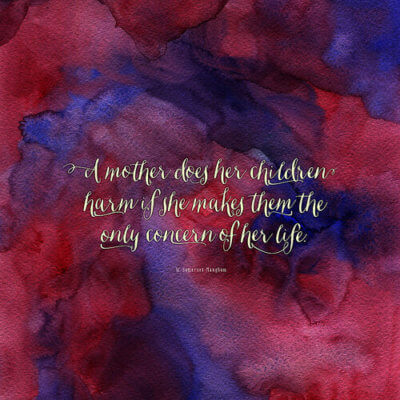What is Engulfment? When Relationships Become Your Everything

By: ljmacphee
by Andrea M. Darcy
The verb ‘engulf’ refers to something being swallowed up, overwhelmed, or submerged. But when we are using the word in a psychological sense, what is engulfment?
Engulfment can refer to a tendency to over-immerse yourself in relationships. You depend on the other to meet all your needs, even demanding that they do so.
So, to reference the original definition, you are submerging yourself in relationships. And, without realising it, you might be swallowing up the lives of others, overwhelming them in the process (or scaring them off completely).
In fact many people suffer from a fear of engulfment, sabotaging relationships to avoid being so overwhelmed. It’s also possible to swing between both. This can be the case with borderline personality disorder. It sees you engulfing yourself in relationships, only to suddenly fear the sensation, panic, and push the other away.
Classic examples of engulfment
An example of complete engulfment can be seen when someone joins a cult. They lose themselves to the leader and the group, letting the cult meet all their needs and becoming dependent on the cult for their sense of self and identity.
Extreme examples aside, most of us experience engulfment at some point in life.
Engulfment could be seen as part of growing up. A mother, in her attempt to protect and take care of her child, can overwhelm her child with love. As the child grows he or she feel suffocated, wanting their independence and making moves to break free. A healthy mother recognises and accepts this, proud her child is progressing.

By: brett jordan
And to a certain extent, engulfment happens, however briefly, in all relationships. It can even happen in friendships, or in the workplace. We could, say, start a new job and be temporarily mesmerised by a charismatic boss, only to eventually see that he is human and then focus more on our own performance.
Of course it’s in intimate relationships that engulfment causes the most problems. When the chemical cocktail of love hits, we can dream of doing everything together. For several weeks there might be a period of stopping normal routines and doing just that.
In healthy relationships, each partner then slowly returns to their own hobbies and routines. A balance is struck between being together and being individuals, healthy and interdependent.
The trouble arises when the break and seeking of balance doesn’t happen. When instead, you let the rest of your life fall to the side and become certain that the relationship you are in is the only important thing. You must make the relationship work at all costs. And that cost might be your career, your physical health, your social life and even your financial stability.
But isn’t love itself engulfment?
No. Despite what films and bestselling books might feed us, it’s not love to lose ourselves in a relationship, nor is it healthy.
Love is not about being so blinded by your feelings you arrange your entire life around another.
Love comes when two people fully see, recognise, respect and support each other. But we can’t do any of this well if we’ve lost sight of who we are.

By: Steve Charman
Again, love does involve a period of meshing, but it also involves personal boundaries. Once those fall (or if they never existed in the first place), you are into the territory of codependency, dependency, addictive relationships, and engulfment.
What causes engulfment?
There are many things that can drive us to be the sort who ends up engulfed by our relationships.
Loneliness – If you do not have a supportive family, or a network of friends you can be your authentic self around, this could drive you to meet all your emotional needs just from relationships.
Low self-esteem – If we feel unloveable, or if our esteem is so low we rarely if ever attract a partner, we can then want to make the relationship that does come along the most important thing.
Feeling misunderstood – If you grew up in a family you share different values from and were always the outsider, meeting someone who finally understands you can seem so exciting you want to fall into the experience.
Fear of abandonment – The fear of being pushed away can lead us to do anything to avoid it.
Why would I be more prone to engulfment than others?
Engulfment happens when we have negative core beliefs about ourselves. Core beliefs are the assumptions we make as a child then continue to see as fact until we learn to question and change them.
If you suffer from engulfment, you might have beliefs such as:
- I am responsible for other people’s happiness
- It’s selfish to put myself before others
- I have to earn and deserve love/ It’s my job to love others
- If I don’t do what other people want they will reject me
- Nobody would like the real me so I have to be what the other person wants
- I only exist and have value if others love me.
These sorts of beliefs can be learned from childhood trauma like abuse, neglect, or loss of a parent or loved one.
If your childhood had no noticeable trauma, it could be down to the sort of parenting where you were encouraged to be ‘good’ and ignored when you weren’t. This sort of dynamic leaves a child constantly pleasing others in an attempt to feel loved. This leads to being an adult with a poor sense of self who seeks it obsessively via relationships.
Personality disorders can be another reason some of us are prone to engulfment issues. Having a personality disorder means we consistently see the world from a different perspective than most other people, and have since young adulthood. Personality disorders that can see us losing ourselves in relationships can include borderline personality disorder, histrionic personality disorder, and dependent personality disorder.
Fear of engulfment
Does the above sound like someone you have been involved with? Since then, have you vowed to never again let anyone so close? Or do you find you never engage in relationships because you are terrified of losing your self, or feeling trapped?
Fear of engulfment is a common cause people struggle with intimacy and relationships. If you’d like to know more about fear of engulfment, sign up to our blog to receive an alert when we run the connected piece in this series, “Fear of Engulfment – When Relationships Leave You Feeling Trapped”.
Worried you have a tendency towards engulfment? Or that fear of engulfment is ruining your relationships? Harley Therapy connects you with experienced and friendly counsellors and therapists across the UK who can help you relate to others in healthier ways. Not in the UK? Try an online therapist, wherever you are.
Do you still have a question about ‘what is engulfment’? Or do you want to share your personal experience with engulfment with other readers? Use the public comment box below.
 Andrea M. Darcy is a writer and mentor who has penned thousand of articles on mental health and relationships. Find her @am_darcy
Andrea M. Darcy is a writer and mentor who has penned thousand of articles on mental health and relationships. Find her @am_darcy





Hello! I just readt the piece “What is Engulfment? When Relationships Become Your Everything”.
And I was just wondering what the sources are? Found the piece really intriguing and spot on from mye experiences on the other side, but would like something to back ut up with.
Hi, what do you mean by ‘back it up with’? Are your own experiences not enough for you to understand yourself? As we’d suggest trusting your own experience is truly the way forward when working to heal. There is no ‘research’ better than listening to and starting with your own experience. And one could say ‘truth’ is a perspective, but if it’s YOUR lived through perspective that is giving you symptoms, then surely that is the one to work on? Psychology is not a science, not something you can see under a microscope. Psychological ‘studies’ are just observations made of groups of people, and psychological ‘terms’ are made by groups of mental health workers seeking to describe groups of people with similar symptoms. As for sources, our writers have studied psychology or counselling, so use what they have learned there with general research.The point of this site is to make general psychological information and helpful knowledge about therapy available in easy to read, wide reach format. If you want a scholarly breakdown then you’d want to use something like Google scholar and research study sites.
Hi!!
For the past 14 years, I’ve really grown to enjoy reading about psychology. Approximately 17 years ago, I was diagnosed with Bi-Polar 2. I still see the same psychiatrist that diagnosed me & prescribed the same medications I still take. The only thing that has changed is the dosage of the medications. They are much lower now than in the beginning.
My interest in reading about different personality disorders began 14 years ago when I met my husband. Shortly after we met, he was diagnosed with BPD. My psychiatrist advised that I start reading as much about BPD as I could, as often as I had time to do so. He told me BPD was a very complex disorder & that if I wanted to stay with the man I fell in love with, it was imperative that I read, read, read. I followed his advise & I know without a doubt, all the reading I’ve done has helped my marriage beyond words. Loving someone with BPD can be quite challenging but I believe it CAN be done. It takes alot of determination on my part to try to understand things my husband struggles with. I’ve learned how to determine when & how to discuss things with him that absolutely cannot just be swept under the carpet & ignored. However, if I don’t approach a problem we’re having at just the right time in just the right way, he is absolutely unreachable. The wrong approach ends up creating an even bigger problem because he becomes more distant & the push & pull thing is a complete nightmare for me. It’s very confusing & sometimes it can last for a few days, a few weeks, or a few months. The hardest thing for me is when I start feeling as though he thinks he can act as disrespectful as he wants when we’re in private but the same rules do not apply for me. God has given me the strength to never give up on him…..I love him very much, otherwise, I would’ve been gone a long time ago!! One of my biggest concerns is that as he gets older, he’ll struggle more with his BPD, instead of improving & continuing to heal. We had a 4 year stretch of life without ANY BPD episodes at all!! I THOUGHT perhaps he had worked his way through his childhood trauma & had overcome the “triggers” he would randomly experience. Once we figured out exactly what his triggers were, he was able to start recognizing when he would start rapid cycling (always in my presence only). He had come such a long way…..I could actually see the look on his face when he realized what was happening to him & he was able to snap out of it & not only apologize to me right away, but talk about what he was thinking & feeling when he was triggered.
Last year something happened to us that can only be described as a horrible nightmare…..he was accused of a crime he did not commit in a county 7 hours away. We spent $27,000 on the entire fiasco & it lasted about 9 months. It was absolutely horrifying to be faced with such a thing. You’re definitely not innocent until proven guilty……you are guilty until proven innocent. This set him back mentally in ways I never expected. We weathered the storm & made it through to the end. However, the aftermath almost destroyed our marriage. His BPD came back worse than ever & I couldn’t reach him no matter what I tried. He was so unreachable & pushed me away in cruel ways with his behavior toward me. Most of the time, it was horrible. The normal days were very few & far between. Thank God, I was able to start reaching him again & he has been getting better & better as time goes on.
I stumbled upon this particular link after googling “Histrionic BPD”. I really learned alot from everything I read. I just wanted to compliment your ability to explain things from a perspective I’ve not stumbled upon in all these years. I was very excited after I finished reading everything & I’m looking forward to sharing it with my husband when the time is right.
Thank you for sharing your knowledge & I loved the way you explained everything.
We are glad you found the article helpful! Sounds like you have been through a lot. And like this marriage is indeed a sort of engulfment, with all your focus on helping your husband over yourself. It’s ok to have bad periods, it’s ok not to understand our partners all the time, it’s ok to let them deal with their struggle by themselves some of the time as we take care of ourselves some of the time. In fact it’s important. It’s that old airplane mask idea…. if we are not pulling down a mask for ourselves to breathe first, we really aren’t able to properly help anyone around us. Plus, if we always try to sort everything out and figure everything out and are always the one taking the initiative, the other person really never gets the chance to take the initiative themselves. All the best, HT.
I never heard of engulfment in regards to personal relationships. The little I read hit like a hammer. HELP
Hi Deborah, it’s worth considering some therapy, definitely an issue that you can work through with some good support.
Hi. Are there any engulfment workbooks, specifically on this subject? Thank you.
Hi there Samantha, unfortunately nobody in the office today had any come to mind, sorry about that, we don’t think there is a workbook on this. It’s more likely to be included in books about relationships. It’s also a great thing to work with a therapist on. Best, HT.
Most of the material on this subject of engulfment seems to deal with the direct suffer.
What advice is their for someone [male] who is intensely in love with one of these [female] people.
As someone who is has been interested in psychology for sometime and has been traumatized in childhood from sever abuse and emotional neglect I can understand psychological trauma well enough.